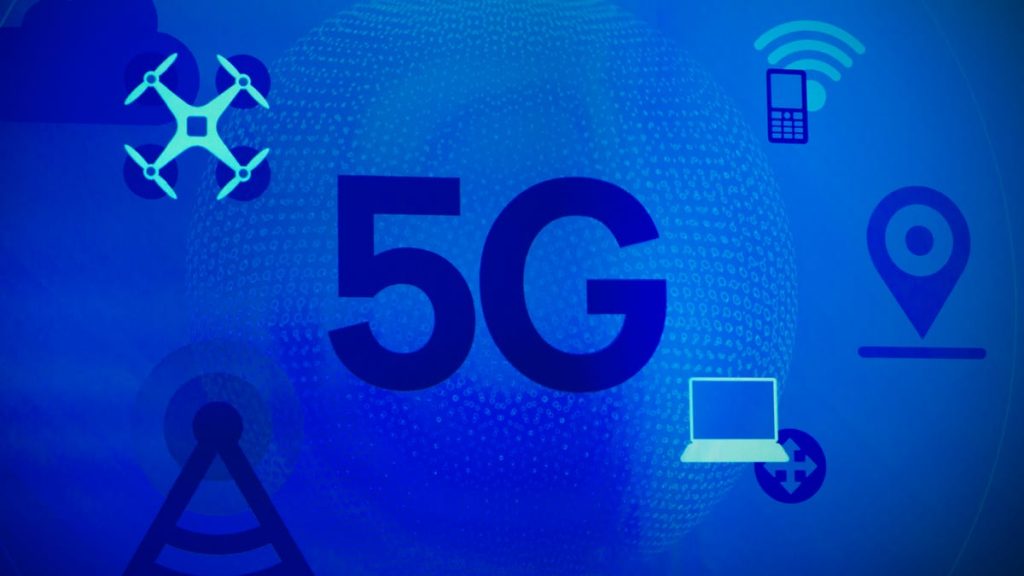5G home internet: Are you tired of being tied down? internet service provider Onerous contracts, slow speeds, restrictive covenants and rising fees? You are not alone. A 2023 customer survey ranks ISPs as second-lowest rated industry in country. Yes, even lower than airlines, social media, health insurance companies, and the U.S. Postal Service. Wow! However, many times, We feel like we have few options and even fewer alternatives. Could 5G be the answer?
technology driven latest mobile phone Also wanted to address our home broadband needs.A stable home internet connection is crucial, whether Home office Or unpack with the latest video games. The earliest 5G home Internet package can be purchased through Starry, Verizon and T-Mobile, offering respectable speeds at a simple price – but availability is limited to select cities and regions. Team has All major 5G services reviewedwe’ve got details on how they work, how fast they cost, and where they’re available.
What is 5G home internet?
Simply put, 5G stands for the fifth generation. What is the fifth generation? Fifth generation wireless data network.You may be most familiar with the term 5G better mobile communications and faster phone. You read that right: 5G networks use different radio frequencies than previous generations and are designed to deliver faster data speeds with far less lag or delay than 4G.
My Team colleagues Eli Blumenthal does a great job breaking down the basics of 5G. Millimeter wave technology uses higher frequencies than previous generations, providing faster speeds and connections. But higher gigabit speeds come at a cost—data doesn’t travel as far as 4G and encounters more obstacles. To solve this problem, mid-band technology provides average speeds of 300 to 400 megabits per second, increasing the coverage offered by millimeter waves. Finally, low-band 5G offers similar range to 4G, but at speeds between 100 and 200Mbps.
Is 5G home internet the same as 5GHz?
No. A common mistake is to see the “5GHz” setting on your Wi-Fi router and assume you have access to 5G. Wireless Router Short-range radio frequencies (usually 2.4GHz or 5GHz) are also used to transmit internet signals to connected devices in the home. Therefore, 5GHz is one of the frequency band options for home Wi-Fi systems, but it is different from 5G, which is a cellular technology that uses higher frequency waves.
How is 5G home internet different?
Most ISPs provide Internet service over phone lines or cables, connecting your home to the wider network.These include common Internet connection typelike digital subscriber line, coaxial cable and fiber optic internet.all these are wired Connection from your provider to your home.
5G home internet, on the other hand, is fixed wireless Internet service, which means the connection between your provider and your home is not wired. With 5G, you need an indoor or outdoor 5G receiver installed in your home to receive the signal.It is similar to satellite internet, but instead of sending signals from satellites orbiting in the night sky, it relays information from closer wireless hubs. Even if you’re on the same 5G network as your phone, the gateway is specific to your location and won’t work elsewhere.
Which ISPs offer 5G home internet?
5G is still being deployed across the country. As a result, the number of providers currently offering 5G home internet packages is relatively limited. For example, AT&T It provides 5G mobile services, but its fixed wireless solutions do not currently utilize its 5G network. But we expect that to change soon – AT&T recently announced that its AT&T Internet Air will soon begin using it.
But right now, the main options for 5G home internet are Starry, T-Mobile and Verizon. All prices listed on this page reflect discounts available when setting up paperless billing. If you decide not to opt for automatic monthly payments, your monthly bill will be higher. Now, let’s explore the features each of them offers.
Star Internet
price range
$30-$80 per month
speed range
50-1,000Mbps
connect
fixed wireless
Key Information
Unlimited data, no contracts, no device fees, easy setup
Starry is a relatively new player in the ISP space. The company was founded in 2016, but it’s not leaning toward 5G connectivity. It doesn’t use the 5G NR radio technology that mobile providers are focused on, but it does use millimeter wave technology as a key aspect of delivering fixed wireless home internet to customers. A Starry spokesman said: “We operate in the 24GHz and 37GHz frequency bands and our network technology is the same across all markets.”
Monthly price includes unlimited data, free equipment and installation, and no contracts. It’s also the only 5G home internet provider listed here with symmetric or near-symmetric download and upload speeds, similar to fiber optic internet services.
Finally, Starry also offers a “30-Day Happy Internet Guarantee” which provides a full refund if you are not satisfied with the service and cancel within the first 30 days.
Notably, Starry filed for Chapter 11 reorganization in February, halting plans to expand into new cities. It will focus on its five existing markets: Boston, Denver, Los Angeles, New York and Washington, D.C.
Check Starry Internet Availability
Starry Internet plans and pricing
| plan | Maximum speed | monthly price | Equipment costs | data cap | contract |
|---|---|---|---|---|---|
| star connection | 30Mbps download, 30Mbps upload | 15 dollars | not any | not any | not any |
| Starry Sky Basic Edition | 50Mbps download, 50Mbps upload | $30 | not any | not any | not any |
| star selection | 100Mbps download, 50Mbps upload | $30 | not any | not any | not any |
| Star Plus | 200Mbps download, 100Mbps upload | 50 U.S. dollars | not any | not any | not any |
| Starry Sky Professional Edition | 500Mbps download, 250Mbps upload | $65 | not any | not any | not any |
| Starry Sky Gigabit | 1,000Mbps download, 500Mbps upload | $80 | not any | not any | not any |
store supplier
T-Mobile Home Internet
price range
$50 per month ($30 for eligible mobile customers)
speed range
72-245Mbps
connect
fixed wireless
Key Information
Unlimited data, devices included, no contracts, no extra fees
T-Mobile Home Internet has the lowest broadband speeds of the providers we listed. That’s because it oscillates between 4G LTE and 5G. It’s not just 5G. T-Mobile “expects” average download speeds for most customers to be between 72 and 245Mbps. When Team tested T-Mobile’s service in 2021, we hit a maximum of 132Mbps.
T-Mobile’s service includes all setup fees and taxes. There are no annual contracts or data caps. It includes a Price Lock Guarantee, which protects you from any price increases as long as you remain a customer. It will also pay a termination fee of up to $750 to switch providers. Current offers include six months of free SiriusXM, weekly benefits available through T-Mobile on Tuesdays, and $20 monthly savings for qualifying T-Mobile Voice customers.
T-Mobile Home Internet Plans and Pricing
| plan | Maximum speed | monthly price | Equipment costs | data cap | contract | price guarantee |
|---|---|---|---|---|---|---|
| T-Mobile Home Internet | 72-245Mbps download, 15-31Mbps upload | $50 ($30 for eligible T-Mobile Voice customers) | not any | not any | not any | Yes |
store supplier
Verizon 5G Home Internet
price range
$50 – $70 per month (50% off for eligible 5G mobile customers)
speed range
85-1,000Mbps
connect
fixed wireless
Key Information
Unlimited data, no contracts, free device, 50% off for qualifying Verizon Mobile customers
Verizon’s 5G Internet service uses ultra-wideband 5G technology, with maximum download speeds of up to 1 GB and average speeds of about 300 Mbps. Upload speeds are not symmetrical, however, and will settle at 50Mbps or less, as Verizon doesn’t exclusively use millimeter wave technology, but a mix of low-band, mid-band and millimeter wave.
Verizon 5G Home Internet is priced at $50 per month with a two-year price guarantee or $70 per month with a three-year price lock, plus some additional benefits. Either way, it’s a total price that includes the device, setup, and taxes, and like all other Verizon plans, it doesn’t require a contract or data cap.
Verizon offers many promotions and offers to attract potential customers. First, it offers an early termination fee credit, giving eligible customers up to $500 in bill credits if they switch from their current ISP and charge ETFs. Second, 5G Home Plus customers can choose between a HomePod (a $300 value) or a $200 Verizon gift card. Finally, customers with an eligible Verizon mobile plan will receive a discount on the monthly cost of either plan, bringing the monthly cost down to $35 or $45.
Read our Verizon 5G home internet review.
Verizon 5G home internet plans and prices
| plan | Maximum speed | monthly price | Equipment costs | data cap | contract | price guarantee |
|---|---|---|---|---|---|---|
| Verizon 5G Home | 50-300Mbps download, 5-20Mbps upload | $50 ($35 for eligible Verizon Mobile customers) | not any | not any | not any | 2 years |
| Verizon 5G Home Plus | 85-1,000Mbps download, 10-70Mbps upload | $70 ($45 for eligible Verizon Mobile customers) | not any | not any | not any | 3 years |
store supplier
Where can I get 5G home internet?
Let’s not sugarcoat this: 5G home internet service isn’t available everywhere yet. While the list of cities seems to be expanding almost every month, most are larger cities in the United States.
T-Mobile Home Internet has the broadest offering of the three focus providers.although Verizon says it will launch in 2022 T-Mobile’s 5G home internet service now reaches 40 million homes, and T-Mobile has grown by leaps and bounds by expanding the availability of fixed wireless service to more than 50 million homes. However, T-Mobile acknowledged that it cannot provide unlimited availability in these locations due to limited network capacity and router inventory.
Verizon’s 5G home internet is currently available in about 900 markets. This means that while it has fewer total homes available than T-Mobile, it does cover more cities.
Starry Internet is available for boston, Denver, Los Angeles, New York City and Washington DC
.Its expansion plans – which include Atlanta, chicago, dallasDetroit, HoustonIndianapolis, las vegas, memphis, Miami, Philadelphia, Phoenix, portland, san francisco and seattle — That plan is now on hold as Starry filed for financial relief under Chapter 11 of the U.S. Bankruptcy Code on February 21.
Is a 5G home network right for you?
The first thing to say is what we often say about ISPs. No matter how good the service is, it means nothing if it is not available at your address. 5G technology is still being rolled out across the country, so we should see some bumps in the road as the effort continues.
Still, the availability of 5G home internet is growing at a pretty rapid pace. Affordable, straightforward, and very appealing—it was a no-brainer for me. Time will tell if this trend will continue as availability continues to expand. Still, it would be real progress if 5G could become a viable broadband option in traditionally underserved rural America. As Team alum Rick Broida said after testing T-Mobile’s service: “When you’re paying less than half what you were paying before, imperfections become more tolerable.”
5G Home Internet FAQs
Is 5G home internet cheaper than other connection types?
5G home internet is one of the more affordable options considering the average download speeds of current plans — T-Mobile’s average speed is just over 100Mbps, Starry’s is 200Mbps, and Verizon’s is 300Mbps. Monthly costs among the three major providers range from as low as $15 (Starry’s low-cost option) to as high as $70 (Verizon 5G Home Plus, without Verizon Mobile discounts). But the monthly cost for each provider includes all fees, taxes, equipment and installation fees. So the monthly fee you see is the monthly fee you pay. Finally, there’s no fixed-term contract required, so you don’t have to worry about any early termination fees.
Is 5G fast enough? Is it suitable for home internet?
In theory, 5G should be able to provide fast connections that match or better than wired or fiber-optic internet. But that’s often not the case with 5G home internet. To improve the reliability and coverage of 5G internet services, most providers rely on a combination of millimeter wave, low-band and mid-band technologies and, in some cases, 4G LTE, which means home internet customers won’t be looking at the current 5G’s true high-end capabilities. But you should see broadband minimum speeds in excess of 25Mbps, and average speeds higher than typical DSL and satellite internet plans.
What does the “G” in 5G stand for?
Simply put, it means generation. In other words, 5G is the fifth generation of cellular technology.
What is the difference between 5G home Internet and wired Internet?
Wired internet—whether coaxial cable, fiber optic cable, or a hybrid of the two—relies on wires to carry data from a central hub to your home. But 5G home internet is a fixed wireless solution that uses an internet gateway to connect your home via radio frequency to nearby cell towers or data centers.


